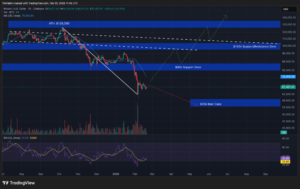
US Senator Cynthia Lummis reiterated her proposal for a Bitcoin reserve to assist in reducing the US national debt. It came after the Treasury Department revealed Monday that the US gross national debt surpassed $35 trillion for the first time.
This dramatic increase starkly contrasts a debt level of $907b four decades ago.
“A strategic Bitcoin reserve could stop this runaway train and help pay down the national debt for our future generations,” Lummis said Tuesday on X.
Today, the national debt has passed a staggering $35 trillion.
A strategic Bitcoin reserve could stop this runaway train and help pay down the national debt for our future generations.— Senator Cynthia Lummis (@SenLummis) July 30, 2024
Lummis Advocates for US Bitcoin Reserve to Reinforce Dollar’s Global Dominance
Fox Business reported last week that Lummis had been quietly developing a bill requiring the Federal Reserve to maintain Bitcoin as a strategic reserve asset.
Lummis publicly announced this bill’s details at the Bitcoin 2024 conference over the weekend. It suggests acquiring 1m Bitcoin over five years for a government reserve. This digital asset hoard, she believes, could significantly reduce the national debt. The Bitcoin would be held for at least two decades. Also, the Fed and Treasury would be required to reallocate existing funds to fund the acquisition.
According to Lummis, such a reserve would “firmly secure the dollar’s position as the world’s reserve currency.”
“Families across Wyoming and the US are struggling to keep up with soaring inflation rates and record-breaking costs while our national debt reaches unprecedented levels; now more than ever, we need to create a brighter future for generations of Americans by diversifying into Bitcoin and securing our economic future,” she said.
Trump Commits to Retaining Seized Bitcoin Assets
During his keynote speech at the same conference, Republican presidential nominee Donald Trump did not commit to an official Bitcoin strategic reserve. Rather, he vowed to preserve the existing Bitcoin holdings that the US has accumulated through asset seizures.
















